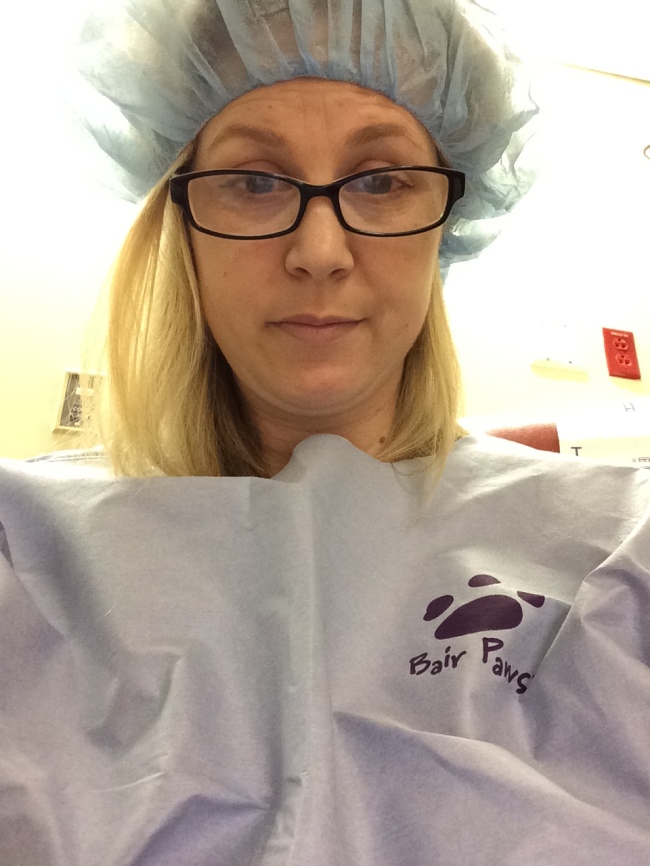I’m three weeks away from speaking to a ballroom full of optometrists and ophthalmologists about patient care and education in Antigua. I can’t believe that sentence just came out of my mouth! As surreal as this year has been, I have had the opportunity this week during my 15th eye surgical recovery to ponder what I might say to these young and eager physicians about how they treat their patients.
I am a very lucky patient. One might not say that given I’ve had 15 eye surgeries in less than 5 years, countless in-office injections and procedures, and nearly two years of chemotherapy to treat my rare eye disease. But I am lucky. I have these as options, where many do not. I have a 5 year background as a student working towards her doctorate in pharmaceuticals at the University of Connecticut. I lived, ate and breathed the chemistry world for 5 years of my life. Never would I have imagined how important a role that would play in my own care and disease. I also happen to live in the Northeast of the United States, home to 3 of the top Uveitis (Inflammatory Eye Disease) Specialists in the world, AND the world’s most renowned Glaucoma specialist, less than a 45 minute drive away. Lucky? You BET I am!
You don’t HAVE to have a PharmD or PhD to know how to advocate for yourself when dealing with a serious illness however. You just have to be your own inner, pushy self. That person that you hide from the world who sits inside of you and is constantly asking, “what now? What IF? How do I do____? Is this drug better? Will it make me sick? What is the next step if this doesn’t work? What are the statistics on this treatment? At what stage is my disease? Are there other people nearby who have this? How can I talk to them?” You NEED to address all of those nagging questions in your head. Being a shy, fearful, victimized patient serves NO ONE well. In fact, you are doing yourself harm each time you don’t ASK a question.
Doctors are incredibly busy. Often you’ll get to your appointment on time to see a specialist and be ‘graced’ with their presence’ after a nearly 90 minute wait. Under NO circumstances should you feel RUSHED. Make a list of questions in advance, and be sure to ask alternatives/options to the treatment they are suggesting and WHY they are choosing NOT to go with those, side effects, and next steps, and how YOU personally can improve the outcome through either exercise or diet or rest, whichever they recommend most.
Going to a specialist can be intimidating. Sitting across from an ‘expert’ about your disease is frightening. It can feel like they have all the cards in their hand, but in FACT, it is quite the opposite. Their reputation is based on how successful they are at treating people just like you and me. If they aren’t successful in managing or defeating your disease, it is a personal loss for them. It is YOUR job to ‘challenge them’ to step their game up on your behalf. Every decision is ultimately yours, no matter HOW ‘matter of fact’ they sound or determined to pursue a certain course of treatment, it is your JOB to question the WHY at each and every turn. Make them accountable, and don’t be afraid to interject a little PERSONAL information about yourself.
Making it personal is important. Before I became a twice a week patient at the Yale Eye Center, none of my doctors understood that some of the treatments they gave me affected my ability to make a living for myself. I am a sommelier. My NOSE and my PALATE are my entire life and career. Without them, I cannot do my job tasting and assessing wines. When they put me on a particular chemotherapy drug that made everything taste like metal, I was beyond furious. But I hadn’t asked the right questions, and hadn’t TOLD THEM what it was I DO for a living. My fault.
By giving my doctors a deadline this time around and explaining my NEED to go back to training for triathlons, I pushed him to find the more permanent solution to the endless cycle of injections and procedures he was making me go through for the past 5 months. Had I not explained the NEED for me to get back on the bike and running and swimming again asap for a National Championship Triathlon race this spring, we’d still be spinning our wheels. Sometimes they need to understand that there’s a PERSON with a LIFE in there, and not a guinea pig.
I’ve had docs on both sides of the spectrum due to the rarity of my disease. Because there are literally NO OTHER PATIENTS in the country with my diagnosis and combinations of three rare eye conditions, I am VERY VERY interesting to all the big-wig docs who want to make a name for themselves by treating me. This affords me the ability to pick and choose from the best of the best doctors and have MANY different opinions from the top glaucoma and uveitis researchers in the world. My case has been presented at conferences all over the United States, the UK and France to the best and the brightest. They are clamoring for the opportunity to get a hold of my chart and ‘fix’ me. Because of this rarity, I am still able to see out of 1% of my eye, and that is no miracle. That was the hard work of the world’s best working on my behalf and pulling out every strange and rare surgery and implant and medication.
The researcher types are VERy clinical and have little personality, as they’re used to being in a laboratory all day and not seeing an actual patient. These guys need constant reminders that you’re not a rat and that there’s a person behind the exam chair. On the other end of the spectrum, I’ve had residents and fellows at teaching hospitals give me their cell phone number and show extreme concern for my mental and physical well being when they can tell that I’m becoming weary of all the poking and prodding and pain and need the ability to reach out late at night when I’m feeling sick and overwhelmed with treatments.
When you are faced with a difficult diagnosis, google can be both your best friend and worst enemy. Balancing the dizzying array of info on the internet and the advice of your doctor can be a full time job. Make it so. But also remember that the internet reports the WORST case scenario of each and every drug and treatment for liability purposes. You will not necessarily fall into that category. However, DO take note of something amiss or odd during your treatment, even if it’s seemingly insignificant, or doesn’t ‘fit’ with the known side effects. The first chemo drug I was given was supposed to have MINIMAL side effects, and would be very well tolerated by most patients. I was unable to walk due to severe vertigo after taking my very first dose. This was a side effect that had NOT been reported to the FDA and my doctors were baffled for 6 weeks until they finally took me off of it and I was able to finally stand up.
Remember that everyone responds differently to treatments and medications and that no two patients or outcomes are alike. I belong to 4 different eye disease support groups for my various conditions, and have to remember that in every country the protocols and drgus are different and that each of us heals differently also. Just because my friend Lisa had a disastrous trabeculectomy, doesn’t mean that I too am going to be affected the same way. But DO take note of these other outcomes to PREPARE yourself for this possibility. Find a support group that is focused on treatments and sharing outcomes. Being part of a group will make your disease less isolating, and you may find treatments, doctors, and drugs that you hadn’t known about otherwise. Support groups can be useful tools in healing both physically and mentally. However, DO remember, that these folks are PATIENTS just like you, and to take their opinions with a grain of salt. They’re looking for answers just like you.
My motto is ‘expect the worst and hope for the best’. This sounds a little dismal, but given the amount of setbacks I’ve had with this disease, I have found that it is MUCH more fun to be pleasantly surprised by a positive outcome than to be shocked and disappointed when it fails. I KNOW the odds are not in my favor, so I consider it a ‘bonus’ when things go well, rather than expect it. The statistics at this point don’t SUPPORT a positive outcome. This doesn’t mean I don’t think positively about my disease, I DO. I am just very honest with myself that no one has beat this disease yet, so every day I have with sight is a gift.
So I want you to march into that doctor’s office next time, whether it’s for you, your spouse, your child, or your parent, and OWN IT. The doctors work for YOU. You are PAYING them for a service. You are NOT a bother. You are their life’s ambition and work. Write DOWN everything. If you are distracted or have bad handwriting, ask if you can record the visit. There is a voice memo option on all iPhones. USE IT. Do your research on drugs, the disease and treatments and outcomes and statistics BEFORE you get to the office. Bring the research with you. Highlight things you don’t understand. If you feel rushed, spend some time with the nurse going over some of it before you see the doctor. Remember. They work for YOU. Become an expert patient. You will NEVER feel helpless again.




Excellent advice!! Great article, as always.
Wonderful advice. I’ve always thought I was “lucky” in that I grew up going to specialist after specialist and essentially learning how to advocate for myself as a patient. It is an invaluable skill.